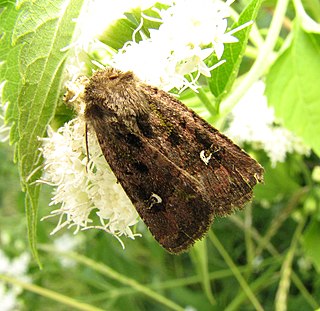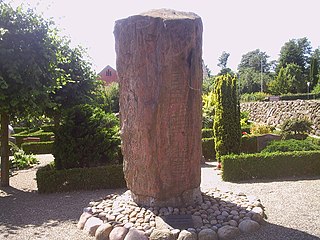The Westeremden yew-stick is a yew-wood stick found in Westeremden in the Groningen province of the Netherlands in 1917. It bears an Old Frisian runic inscription, dated to the second half of the 8th century. With a total of 41 letters, this is the longest of the extant Frisian runic inscriptions.
According to the Primary Chronicle, the first Rus'–Byzantine Treaty was concluded in 907 as a result of Oleg's raid against Constantinople. Scholars generally consider this document as preliminary to the Rus'–Byzantine Treaty of 911.
The Rus'–Byzantine Treaty, between the Byzantine emperor Constantine VII and Igor I of Kiev, was concluded either in 944 or 945. It was a result of the Rus'-Byzantine War of 941 undertaken by Kievan Rus' against Constantinople. Its provisions were less advantageous for the Rus' than those of the previous treaty, associated with the name of Igor's predecessor Oleg. It was one of the earliest written sources of Kievan Rus' law.

The Gunderup Runestone, or DR 143, is located in Gunderup, North Jutland County, Jutland, Denmark. It is notable because it is one of few runestones raised in commemoration of a woman.

Caenurgia is a genus of moths in the family Erebidae.

Lacinipolia is a moth genus in the family Noctuidae.
Halographis is a genus of lichenized fungi in the family Roccellaceae; according to the 2007 Outline of Ascomycota, the placement in this family is uncertain. A monotypic genus, it contains the single species Halographis runica described in 1988.

Caenurgia adusta is a species of moth of the family Erebidae. It is found in the Caribbean, including the Dominican Republic and Haiti.

Caenurgia togataria is a species of moth of the family Erebidae. It is found in the southern parts of the United States, south to Mexico.

Sö 328 is the Rundata catalog number for a runic inscription on a Viking Age memorial runestone which is located in Tynäs, which is about one kilometer east of Strängnäs, Södermanland County, Sweden, which is in the historic province of Södermanland.

The Skern Runestone, designated as Danish Runic Inscription 81 or DR 81 in the Rundata catalog, is a Viking Age memorial runestone located in the small village of Skjern, Denmark between Viborg and Randers. The stone features a facial mask and a runic inscription which ends in a curse. A fragment of a second runestone designated as DR 80 was also found in Skjern.

The Læborg or Laeborg Runestone, listed as DR 26 in the Rundata catalog, is a Viking Age memorial runestone located outside of the village hall or Forsamlinghus in Læborg, which is about 3 kilometers north of Vejen, Denmark. The stone includes two depictions of the hammer of the Norse pagan god Thor.
Étienne de Bonneuil, also Estienne de Bonnueill, was a French master builder or architect in the second half of the 13th century. He is remembered for participating in the design and construction of Uppsala Cathedral.
Runica is a village in the Lipkovo municipality, in North Macedonia. In the Middle Ages, there was a village called Rućinci, which was one of the villages granted (metochion) by sevastokrator Dejan to the Arhiljevica.

The Euclidiini are a tribe of moths in the family Erebidae. The tribe was erected by Achille Guenée in 1852.
Alaševce is a village in the municipality of Lipkovo, North Macedonia.
Gošince is a village in the municipality of Lipkovo, North Macedonia.

Klaus Düwel was a German philologist who specialized in Germanic studies. A professor at the University of Göttingen, he was recognized as one of the world's leading experts on Germanic Antiquity.







